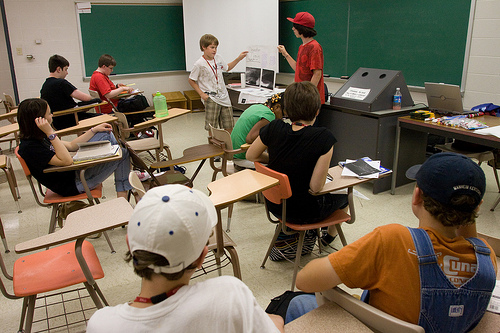
Photo used under the Creative Commons License
Celeste Forrest, Staff Writer
Now, I understand that not everyone here is an Education major. However, we can all agree that there is something special about your major that sets it apart from all the others. For example, theology and ministry majors have 5-20 hours of internships a week. Nursing majors get to intern at various hospitals. Music majors have the superpower to use the piano practice rooms whenever they want, however they want. Educations majors, however, get to do something uber special called observations.
Observation, in theory, is a seemingly simple task. All one has to do is sit in a classroom, observe the teacher and take note of how the teacher teaches. Basically, you’re sitting and watching. A student observer can take notes, walk around and ask students questions or make small talk with the teacher if he or she feels so convicted.
Then, depending on the grade level you are observing, the subject, the teacher, the students, how big the classroom is and how many shiny objects there are in the classroom, you might find yourself falling asleep or getting distracted. I, after observing both high school and middle school for two semesters, can personally testify to this.
Last year, while observing high school, I had the delight of being in a fun, highly decorated English classroom with an awesome teacher that looked and acted like Miss. Frizzle. Her students behaved, more or less, like the students in the Magic School Bus. My experiences while observing high school basically confirmed my calling as a future high school English teacher.
Then, middle school happened. I’ve been observing middle school since the beginning of the spring semester, and I wonder how I’ve survived for this long. Middle school is tough to observe, not just because the students are still somewhat in the transition between kids and teenagers, but because this is also a time when students are trying to identify themselves.
In addition, middle schoolers gain more freedom and are old enough to make most decisions themselves, however, responsibility, organization and self-motivation are all new concepts to them, and it takes them a while before they can put these skills to practice. To be more frank, middle school is a jungle and just like exploring any new wildlife, it’s important to be prepared for the challenges you may meet. Here’s a practical guide about how to observe middle schoolers, for your convenience (and safety).
1. Never look a middle schooler in the eye. This is a challenge.
2. Approach middle schoolers with caution. They can smell fear.
3. If you do happen to approach a middle schooler, do so slowly and offer a peace offering. This could be an energy drink or a candy bar. Pokemon cards and Cheetos work too.
4. Be careful where you walk in the halls; middle schoolers are territorial, particularly around their lockers.
5. Speaking of hallways, get to know your school’s layout as soon as you can so you won’t get lost in the crowd, especially when you’re 5’ and you have difficulty seeing over most of the students’ heads.
6. Love them and have patience! Middle schoolers, while they act like the Energizer Bunny on steroids at times, can be some of the more interesting people you will ever meet. They are just starting to understand the world around them, and it’s always fun to hear their perspectives on school, relationships and life in general. When they’re not being snarky smarty-pants, they can be pretty adorable too. The awesome part about observing middle school is you will never have a boring day!
The most important part of observing, or spending any kind of time, in middle schools is to keep in mind that while you are watching your students, your students are watching you. Whether you are helping the teacher pass out papers, checking on students as they work or simply walking through the doorway, be someone they can look up to. Show them, do not just tell them, that they have potential and talent.
Compliment their work, even the little doodles they do on the margins of their papers. Praise them for their little acts of kindness that usually go by unnoticed. Inspire the shy to speak out and help the lonely to feel connected. Be Jesus to them, and in the end, you’ll find that observing middle school is not so hard to survive after all.
